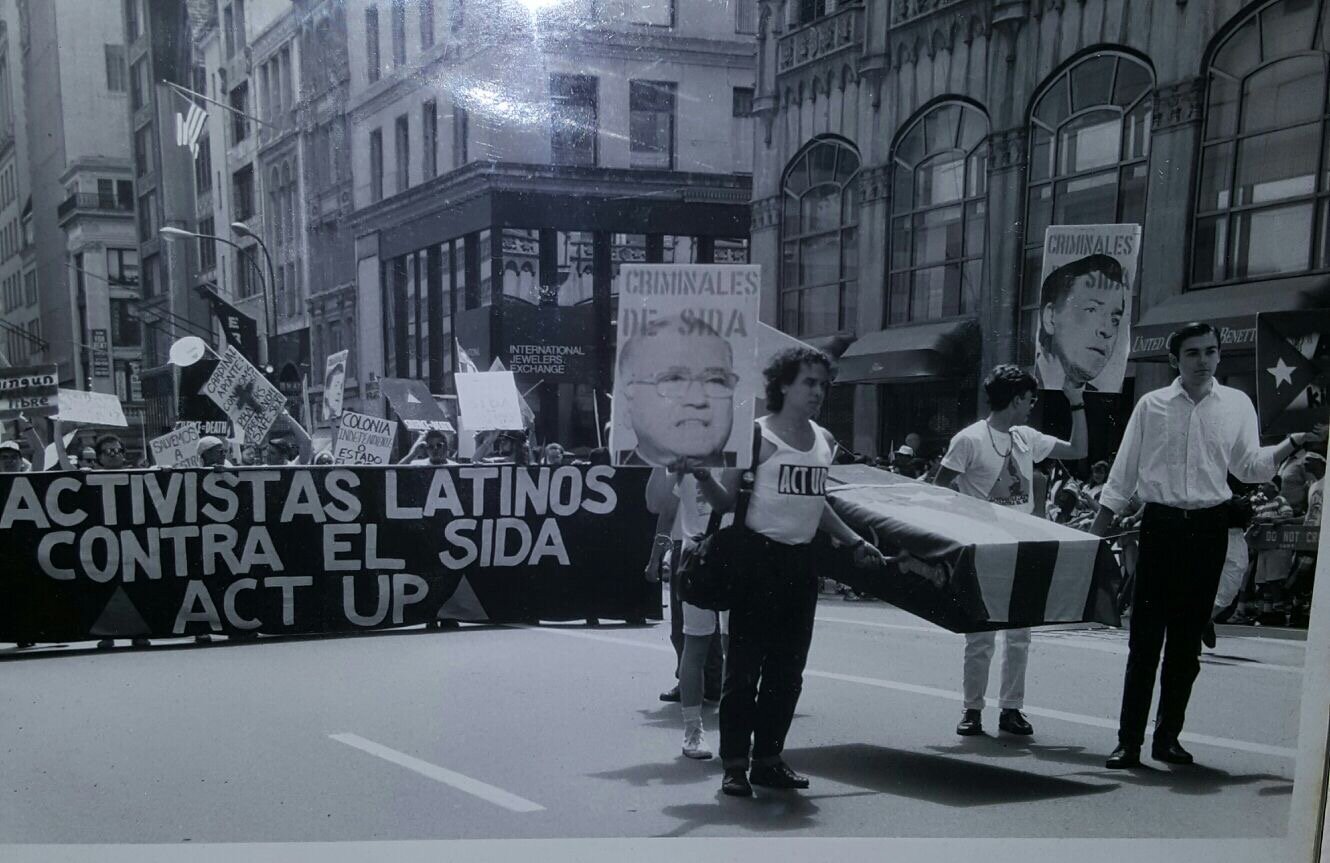Silencio=Muerte: An Interview with Julian de Mayo on the Legacy of ACT-UP’s Latina/o Caucus
There are obvious parallels between the COVID-19 pandemic and the global AIDS crisis, as many have observed. AIDS activists were once on the frontlines of a deadly infectious outbreak. They are familiar with silence in the face of death and the desperate wait for a cure. Many, in fact, are still on the frontlines, having built careers off of their early experiences with AIDS activism. Not all of their stories have been told, however. Historical memory is fraught with omission. The Latina/o Caucus of ACT-UP (AIDS Coalition to Unleash Power) is one such example. Despite a legacy that includes Homovisiones—the first LGBTQ Latino cable television show—which documented HIV’s impact on Latino communities, and the first Spanish-language magazine in the US to address HIV/AIDS issues, their decidedly Latino brand of activism to spread awareness and combat stigma during the onset of the AIDS crisis hadn’t received much recognition. This would change with a chance encounter at a gay bar in Hell’s Kitchen between a young grad student named Julian de Mayo and a former member of the group. De Mayo, as many others, had been interested in the seminal history of ACT-UP, but unaware of its Latina/o Caucus. He soon discovered an intersectional, inclusive, and transnational coalition that had been overshadowed by the hero worship of its gay white male peers. Moreover, these Latino activists catered specifically to the needs of Latino communities in which factors like housing, immigration status, unemployment, racism, and incarceration compounded the AIDS crisis—very much like novel coronavirus today. In the better part of a decade that followed, de Mayo has completed extensive research on the Latina/o Caucus, while organizing public events at the New York Public Library, where the ACT-UP archives are held, and most recently, at the Brooklyn Community Pride Center, which hosted an exhibition of archival materials in 2019.
In observance of World AIDS Day, de Mayo spoke with Intervenxions over Zoom to give an overview of his project and discuss a forgotten legacy of Latino AIDS activism, which echoes into the present.
*This interview has been edited for length and clarity.
Néstor David Pastor: How exactly did the Latino Caucus of ACT-UP come to be?
Julián de Mayo: The first step towards the Latino Caucus is actually a Spanish-language committee. Their job was to translate the materials that ACT-UP was developing. But then, in 1990, some of these Latino activists are like, “Okay, we actually need to do more advocacy, and more activism that is Latino specific, we’re not just translators or your secretaries.” Which was a critique, of course. There was a hierarchy that leaned towards gay white males whose purpose was really to get pharmaceutical companies to create drugs. That was their number one concern.
But what about intravenous drug use? What about housing? What about immigration? What happens when medication becomes available? Who's going to have access to that? [Latino members] had a whole different set of issues that they did not feel were being represented in the general ACT-UP conversations. And that's why in 1990, they decided to create a caucus. This is quite interesting, because in ACT-UP you have several working groups, but the Latino Caucus had a different level of autonomy. Because a caucus meant that they had control over who could join. It was very politically astute, but also a politically sensitive issue, because one of the big things that they decided to do is run the meetings in Spanish. That, by default, excluded a lot of ACT-UP. Once this group is created, which is a small group at first, that's when you see people from Puerto Rican communities uptown who are part of churches, former inmates who had contracted HIV through intravenous drug use—they start coming to the Latino Caucus, not necessarily because it was ACT-UP, but because it was the Latino Caucus. So this space they created allowed for an incredibly diverse coalition to form. There were straight people. There were queer people, gay folks, parents. It was super diverse. And that was part of how they had to operate their organization. Their caucus was extremely intersectional and extremely respectful in their language and in the issues that they addressed.
Néstor David Pastor: You mention intersectionality and diversity within the Latino Caucus. What common ground brought the group together and who were these individuals?
Julián de Mayo: I think what united them was an absence of people organizing, talking, and caring about how AIDS was impacting Latino communities in New York City. There was some common ground there. Intravenous drug use, for example, was a way of transmission among Latinos. Whereas gay white men [were affected] in a certain way, in Latino communities, the main vector was actually intravenous drug use. But that was not being talked about in Latino communities. And it wasn't being talked about in these gay white male circles. There was no real outreach to Latino leadership in the city. I think that that sort of absence brought people together.
A lot of people were recent immigrants from places like Peru, Argentina, Colombia, Chile. That group was mostly gay men who had survived dictatorships, who had also been politically active in their home countries. But then you also have a significant amount of Puerto Rican folks that were both migrants to New York—people who had grown up in Puerto Rico—who were also politically active, some of them in the sovereigntist movement in Puerto Rico. But then you also had Nuyoricans—people that were from these communities in the Bronx, Bushwick, [and] the Lower East Side, living through a very acute crisis with drugs and AIDS in their communities. You also had Mexican-Americans, Chicanos, from out west. They [all] join ACT-UP at different times.

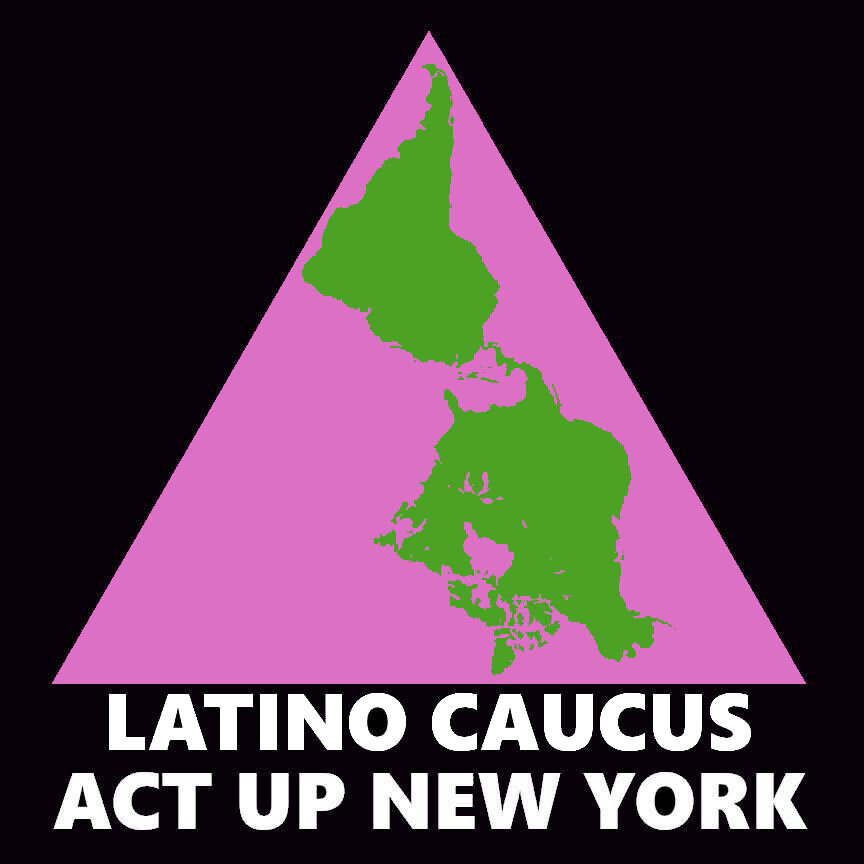
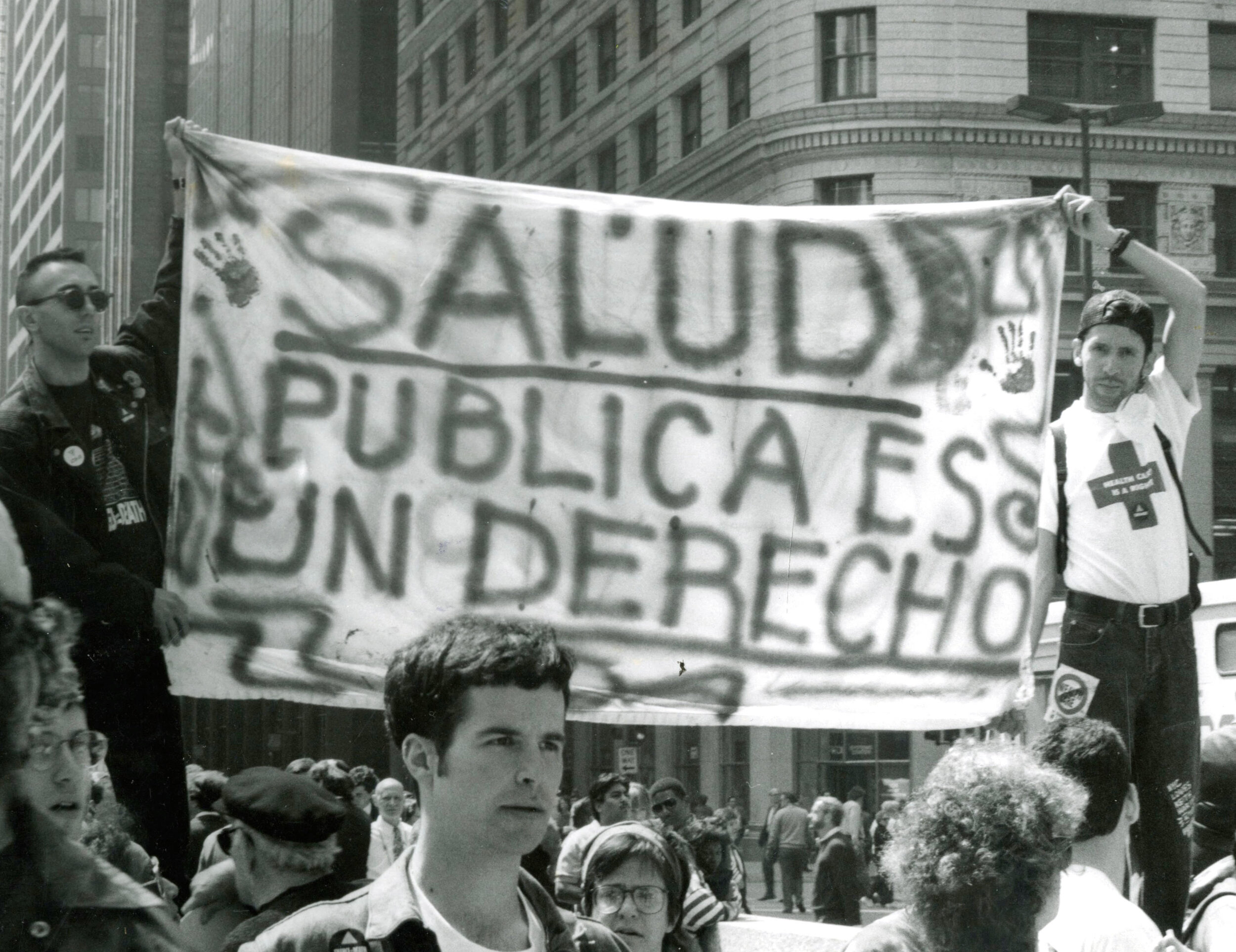
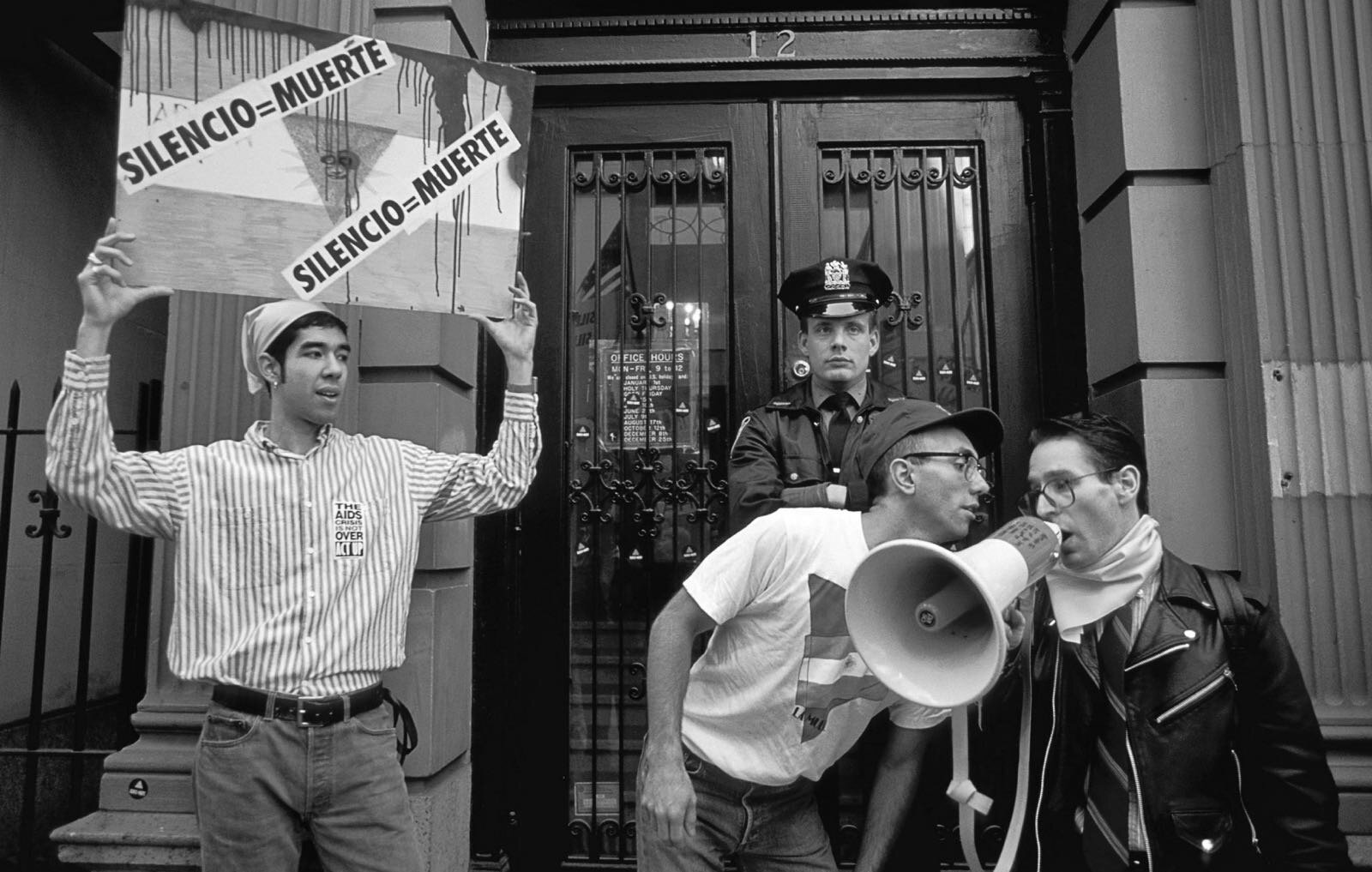



Néstor David Pastor: Can you discuss the work of the Latino Caucus in Puerto Rico?
Julián de Mayo: Puerto Rico had one of the highest concentrations of infections, in part, because of its relationship to New York and because intravenous drug use was also an epidemic in Puerto Rico at the time. You had complete neglect from [Pedro Rossello], the governor of Puerto Rico. And [because] of its condition as a colony, [there were] caps as to how Medicare was being dispersed. So Puerto Ricans didn't have access to medication in the same way that people on the mainland did. Worst of all, the government wasn't even advocating for more money from Congress—they weren't doing anything. So the Latino Caucus proposes to ACT-UP to go to Puerto Rico [where] they organize a grassroots movement. The idea is to do a series of different demonstrations around an HIV-AIDS conference that was happening on the island. And so 40 to 50 activists from ACT-UP New York come to Puerto Rico, and they're able to roll out all these different demonstrations. It was incredibly effective. It was the first time that you had sort of an activist civil society response to AIDS in Puerto Rico. It was the first time that the media was talking about issues like drug use, stigma, and the church. And it was the first time, from what I understand from activists in Puerto Rico, that you had queer people, LGBT people on the streets, in a visible manner. They were also able to sort of create what became the backbone of the LGBT Pride movement in Puerto Rico. So a year after that demonstration, you had the first San Juan Pride Parade. It was the same activists. Also, very importantly, they created ACT-UP Puerto Rico.
Néstor David Pastor: Can you expand upon this notion of transnational activism and solidarity throughout the rest of Latin America?
Julián de Mayo: I think that this whole notion of transnational activism is super interesting. So many of the [Latino Caucus members] being from different countries, immigrants, and having these ties to their communities back home just completely impacts and influences what they advocate [for].
They protested in the Argentine Consulate in New York because Carlos Menem, the president of Argentina at the time, was not granting official status to Comunidad Homosexual Argentina (CHA), an LGBT organization doing a lot of HIV work. And so the [Latino] Caucus convinces ACT-UP to finance this whole campaign around protesting Menem’s visit (on two occasions, at the consulate and at Columbia University). I think it's really interesting because ACT-UP, in its inception, doesn't necessarily have a global sense of responsibility and solidarity. This is totally embedded into the DNA of the Latino Caucus, right? Because as immigrants, they're concerned about how HIV is playing out in Latin America. Like M. Alfredo González is a medical anthropologist. He's been working throughout the region to basically mobilize different communities, including the Garifuna, because they've been hard hit by HIV. So I think [something] that's ongoing throughout their careers.
I also think of the AIDS recycling [program], which is still around today. It’s the biggest HIV medicine recycling organization in the world. And it started from the Latino Caucus. They were basically getting the word out to people [that] if you're not using your medication, give it to us. Jésus Aguais, who's the executive director of AID for AIDS, started his career doing this work. And in the Latino Caucus, again, speaking to that transnational sort of perspective—they knew that the audience was going to be a Latin American audience, so they created an offshoot of Latina/o Caucus called ACT-UP Americas focus on these transnational issues.
It's true that during the pandemic, when I’ve talked to them, this is something they're always thinking about—like how the pandemic was manifesting in Latin America and monitoring how governments were responding to it: [like the] human rights abuses, authoritarian policies that were being carried out in Mexico, Central America while using the pandemic as an excuse. So we have Gonzalo Aburto, who now actually works for an HIV organization, Sero Project, which works on ending criminalization of HIV and that's what his research has been. A lot of this year has been really focused on monitoring how countries were infringing on human rights during COVID-19 and how HIV activists are some of the first people to call that out because they have that experience. They have the capacity and the language to do that. And they have the networks to organize.
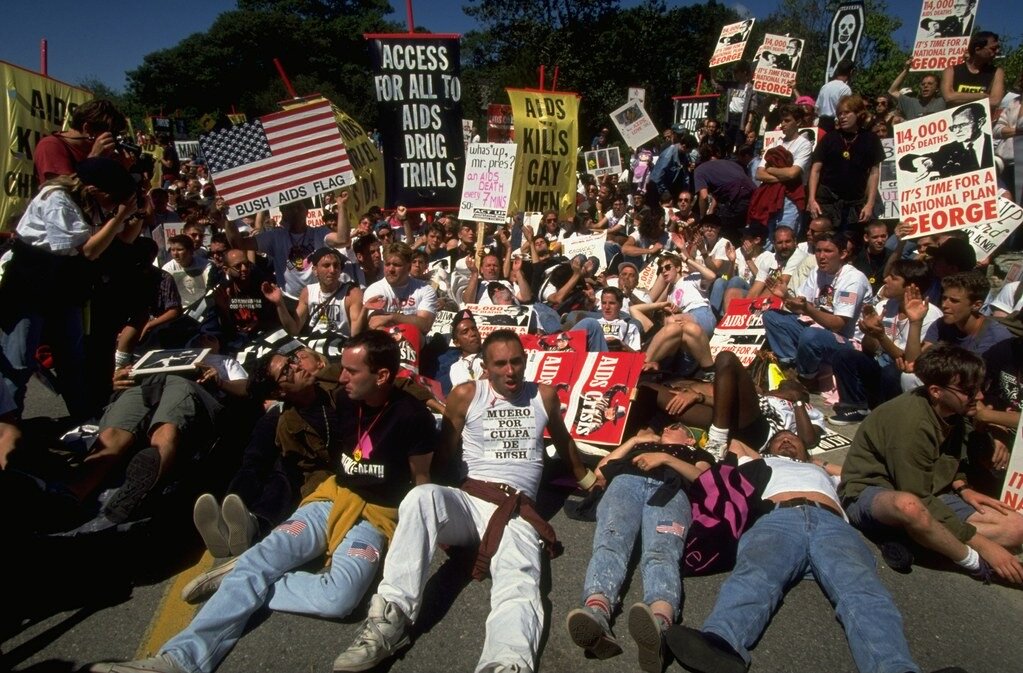


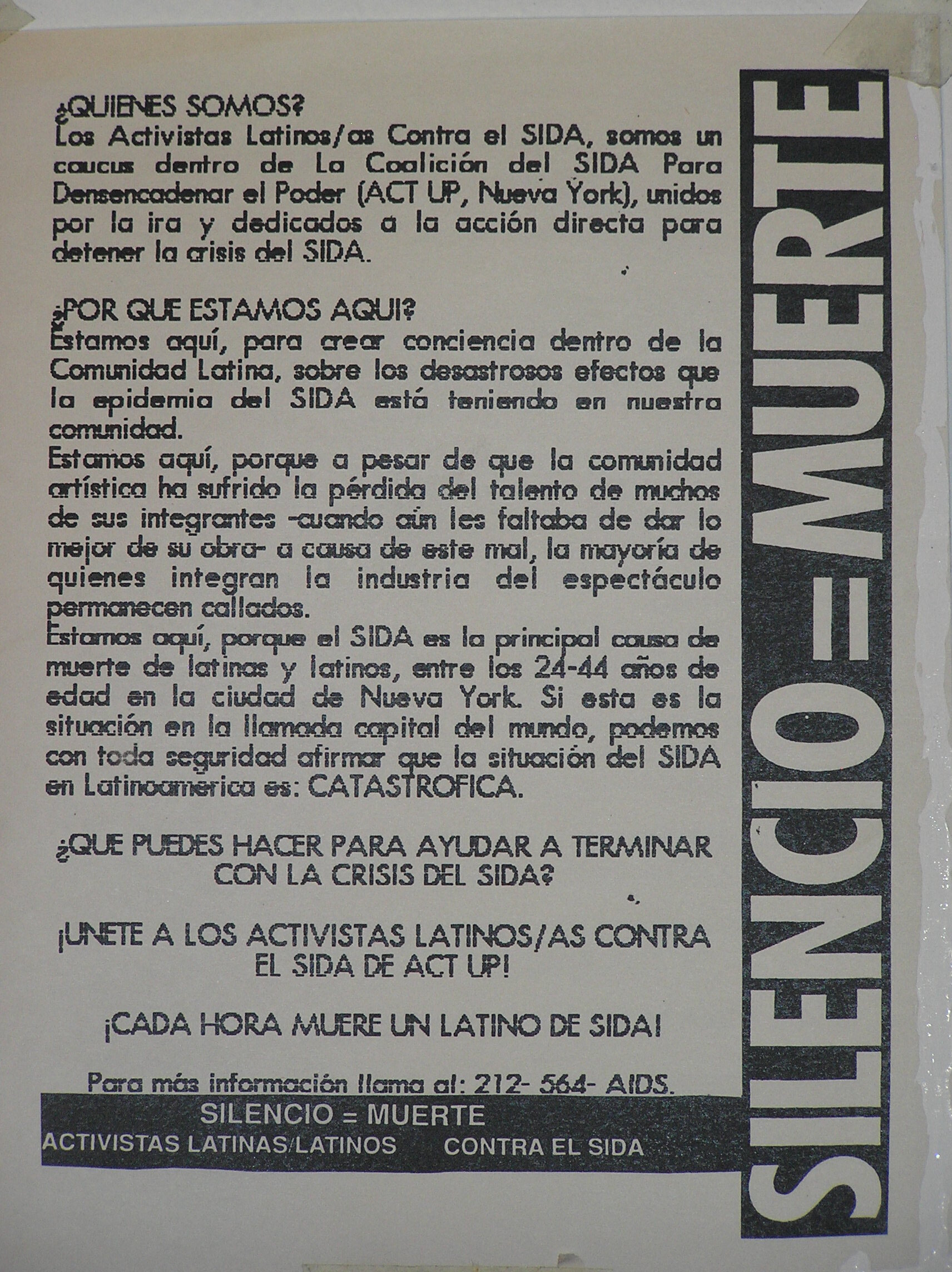
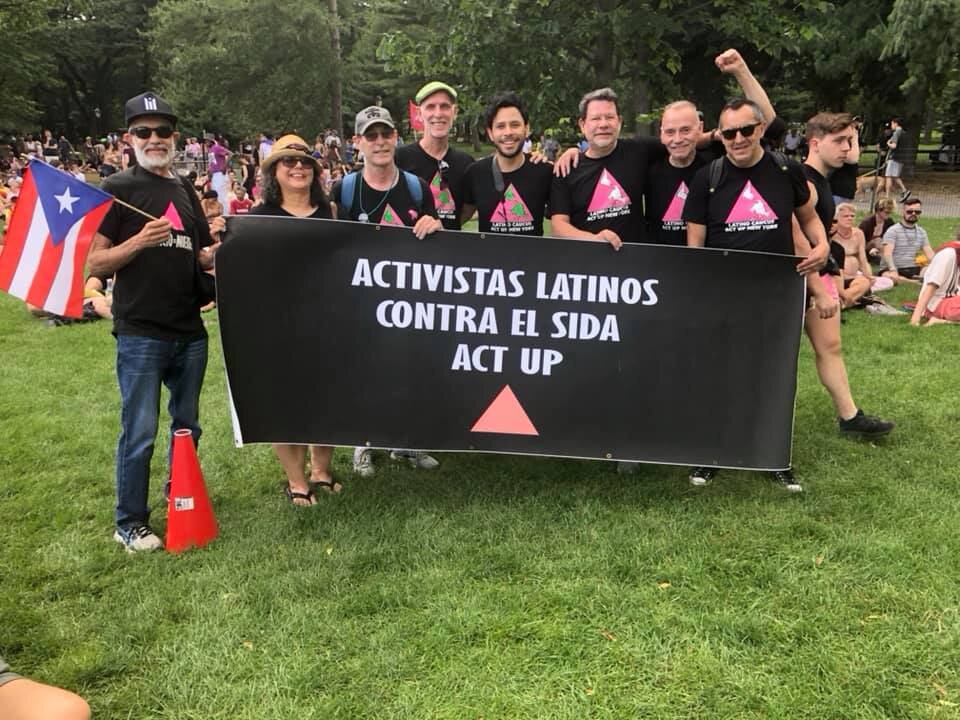

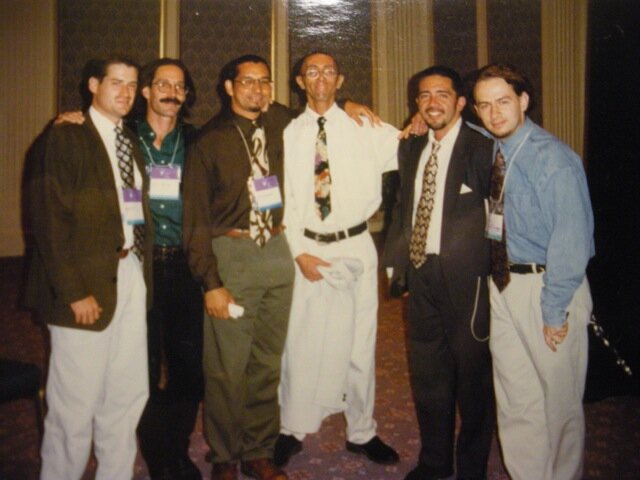
Néstor David Pastor: In 2019, you organized an exhibition at the Brooklyn Community Pride Center called “(ES)tatus: the Latina/o Caucus of ACT-UP New York,” which presented immigration status and HIV status as intersecting themes. How would explain this framing?
Julián de Mayo: I think of stigma, which is something that unites these two topics: immigration status and HIV status. It's about these categories that are developed by the state and reinforced in the public imaginary: good and bad, clean and dirty. They're taken up as these statics things. Like you're HIV positive, that's a real thing. And your immigration [status] is a real thing that determines your value [to society]. So it was a way of questioning not only the language, but the concept. How did these things arise? How did immigration status arise? How did we think of HIV as a status? How did we even think of these things as a status?
We look at immigration policy. HIV affected immigration policy in the US, even formed it. The US travel ban for HIV-positive people [was] on the books up until 2010. [President] Obama got rid of the ban, but it was enforced to different degrees throughout these last decades. Recently, the Trump administration was considering reinforcing restrictions on HIV-positive immigrants. Apparently, there were reports along the border of people being tested for HIV at the detention centers, which should not be a determining factor [for] somebody to be accepted or rejected into this country.
The Latino Caucus, a lot of them are immigrants, people of my parents’ generation. They were immigrants doing this work and thinking about HIV and how a lot of them were HIV-positive immigrants and how as activists their immigrant status meant something. You had ACT-UP going to demonstrations and getting arrested, but people who were undocumented can’t take those risks. That was a reality for a lot of the Latino Caucus members because that would jeopardize their ability to stay in the US.
Nestor David Pastor: What has it been like to connect and develop relationships with former members of the Latino Caucus?
Julián de Mayo: It's been such a blessing. They’ve become my family in a way. They're like my LGBT elders in New York. They're such an important part of my life. I literally have my Latino Caucus WhatsApp group. And it's even busier than my family WhatsApp group! We're always keeping abreast of each other's lives and supporting each other. I feel so privileged that they allowed me into this world. When I started doing this work, I do remember there was a bit of pushback. They feel like they've been forgotten.
Between 2014 and 2015, you had several documentaries about the AIDS crisis, and several exhibits around [New York City] and globally. But there was this complete omission of Black, Latino, and women’s participation in the AIDS movement. So that's kind of the era where I was starting to do this work. Back then, my issue was I really want this story to change how people think of Latinos and expand the collective memory. And I still want to do that. But I think what is becoming more and more important for me is [that] I want to bring the story to Latino youth. And sometimes I do feel a bit of urgency because since I started this [project], two people have passed away. I was super worried about my elders and fortunately, everybody has been healthy. I definitely know that they want to be seen and I want to give that to them.
Born in Colombia to Chilean and Colombian parents, and raised in Canada, Julián de Mayo is a memory activist and media professional living in the United States. For more information, contact: demayo.j@gmail.com or follow him on Twitter: @j_deMayo
All photos courtesy of Julián de Mayo.

